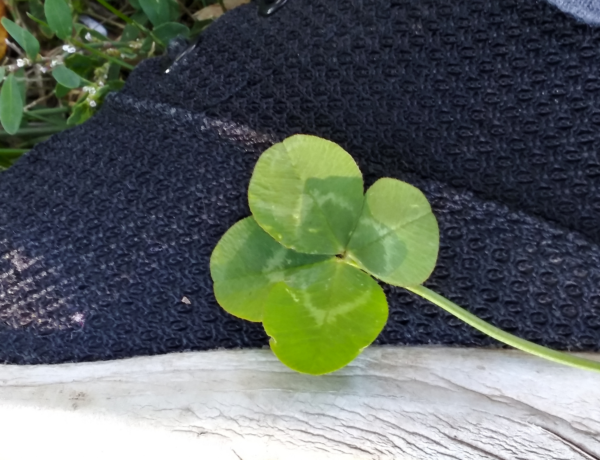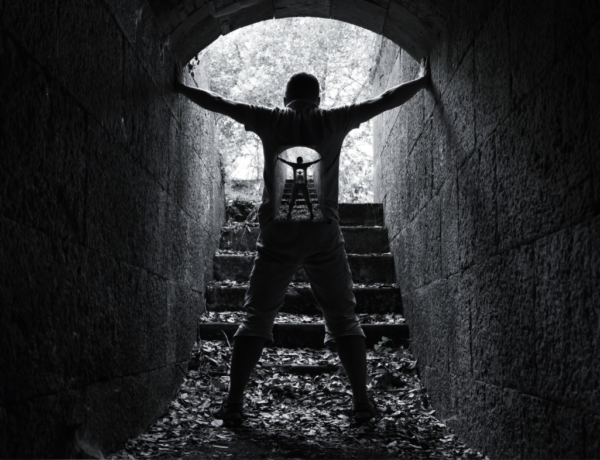I never liked talking on the phone. Even now, in prison, where the most efficient connection to the outside world is the telephone, I still hate having to talk on the phone. It took a month for me to call from prison. So, I only called my father that day because I felt obligated. “You heard what happened to your grandma?” he asked. My heart dropped; I fell silent. “She fell. She was on the floor, alone in her room, from 8am to 3pm.” Tears, hot and salty, welled in my eyes. I turned away, my back to the dayroom. Other inmates couldn’t see me cry.
I hung up with my father, still facing away from the dayroom, and thinking of my grandmother. She raised me from the tender age of two-my parents too preoccupied with drugs to care for me. Before calling her, I let the tears flow, silently but freely, coming to terms with a fact that, up to that point, I refused to face. There was a very real possibility that my eighty-seven-year-old grandma could die while I was in prison.
As a child, death never knocked on a door too close to my house. By that, I don’t mean death wasn’t all around me- it was- but it did not affect me in the way it did other people. I lived in a seedy area of Waterbury, Connecticut. Violence and drugs ran the law, and police routinely drew chalk body outlines on the corner outside the bodega at the bottom of my hill. My uncle’s dog Thor, mine by proxy, died of cancer. A car struck the neighbor’s chihuahua after it chased a ball into the street. In a way, death was an imposing, meddlesome neighbor searching for ways to invade my life.
My closest encounters with death came in the form of two family members passing. Though I was young, I was old enough to understand the permanence of death, the irreversible changes that came with the loss of life. A cousin drowned at a lake. I attended her funeral and remember the weeping. But the only thought or feeling I recall having is wondering how riptides worked at lakes.
My uncle hit his youngest brother in the head with a shovel. It was an accident. During an argument where my uncle thought his brother intended to swing on him, and in defense, brained him with the shovel. To be fair, the blow didn’t kill him; the resulting infection did. When the adults returned from visiting him in the hospital, my dad pulled me aside, “You know Uncle Mike died, right?”, his hand on my shoulder, and a tone much too casual for the occasion.
“Oh,” I said. “I didn’t.” And I walked away.
Elisabeth Kubler-Ross writes in On Death and Dying that children see death “as an impermanent thing.” Perhaps on some unconscious level, I didn’t fully understand the finality of death. Maybe I’d have the opportunity to see my cousin and uncle again. The memorial services were sad, but weren’t they always? The indifference I felt, and still feel, brings me deep guilt. They were young. One not even a teenager and the other in his thirties and would have gone on to do great things, I’m sure. But the act of mourning felt more compulsory than genuine. Throughout high school and college death lived on the periphery, friends of friends, parents of acquaintances, social media buds that lived across the country. I guess I was lucky in that it never struck me the way it struck others, and when it came close, my disposition rarely faltered. I did, however, think of my death all the time. How it might happen. If I should do it myself. Who would come to my funeral. My morbid fixation with my own death continued fiercely and stubbornly like a curse that ultimately summoned Death himself for a face-to-face meeting.
My friend Johnny killed himself in July 2022. His death marked the end of a trauma bond that started when a mutual friend poisoned us both with Fentanyl, leading directly to my fatal car accident and our subsequent downward spirals. A month after my accident, Johnny drunkenly crashed his car into a utility pole, injuring his friend. Faced with the prospect of prison, my own drinking and drug use increased. Quite simply, I did not care about what happened to me, my body, or my eternal soul.
Our friendship was intense, full of late nights, long sleepless days. We shared beds like little kids, talking all night about our posts, our futures, our hopes, and dreams. Johnny and I drank and drugged our problems into submission; they tapped out but always came back. They always came back.
Through those fucked-up nights, the crying, the admissions of suicidal ideations, I thought we came out stronger. He always called the next day to make sure I was straight. He had a girlfriend with a son and was excited to father his own children with her. Then he was gone.
I woke up to a text message that day: “They found him, bro. He’s dead.” I screamed. When I told my aunt, Johnny was dead she lamented: “Not my other little nephew”. He’d helped us move a couch a week earlier after an all-night bender. My legs felt like limp pasta. When I could muster enough strength, I walked to Fulton Park and cried. I watered the grass with my tears for hours, thinking, reminiscing, feeling guilty. The cops said he looked peaceful. Some consolation that was.
As sad as I was, I also felt anger. The process of grief always includes some qualities of anger, writes Kubler-Ross. And that anger scared me, made me feel wrong. How could I love someone so very much, yet feel such intense hate for the same man? Kubler-Ross asserts these conflicting feelings are the result of feeling deserted, and contends this dichotomy is human. Despite knowing this, I judge myself for the anger, tell myself it’s wrong to feel upset with a dead person, especially my best friend. Sometimes, I don’t want to be human.
Now, I live in a dorm at Willard-Cybulski Correctional Institution. I am eight months into a three-year sentence for manslaughter with a motor vehicle. The dorm where I begrudgingly formed a therapeutic community. Residents are required to attend recovery meetings. Through these meetings, I have gotten to know other men, and their struggles. I have gotten to know myself and where my addiction stems from. But, at its core, the dorm is for DUI offenders – that is, short-term residents.
In February 2023 a celebrated member of our recovery community went home. Five days later, he died of an overdose. That hit home, shook me to my core. For about three months, he did the hard work. He attended meetings, shared extensively, spoke openly and candidly about his struggles and his desire to stay clean for his daughter.
It’s real out there, and as a more permanent member of a revolving dorm, it may be prudent to abstain from forming close bonds with the men here. My best “jail friend” Kenny leaves soon – maybe within the week – and he’s struggled with addiction his whole life. “This is the longest I’ve been sober,” he reminds the community on a regular basis. He and I are maybe too close. We talk about our plans to be sober legends in the world, taking on recovery together. As much faith and hope I have for him, there is a very real possibility he may be dead before our plans can come to fruition. It’s happened before, and not only does it scare me, but it breaks my heart.
Once when I was about nine, I was watching an episode of Charmed with my grandmother and started crying, “What’s wrong, baby?” she asked over my sobs. I told her I couldn’t stop imagining her funeral. “I’m not dead” she consoled.
“But you will be.”
To this day I have a recurring dream where my late uncle, rotted and decaying, knocks on the door of my 2001 apartment. Back in my ten-year-old body, I open the door with hesitation. “Why’d you break my leg?” he asks, holding his desiccated, detached leg, broken bone protruding from the point of separation. My reaction is always the same- a stare not of terror but of confusion because I didn’t break his leg.
My days now are painted by death, my future tainted by the same. There is not a day where I don’t think of the life I stole, my friend Johnny, or my grandma’s or my mortality. In Chasing Daylight, Eugene O’Kelly writes about how acceptance of his impending death of brain cancer, transformed his life. One item on his to-do list was to live in the moment.
As a result of my fascination with death, my life has become a waiting game. Constantly waiting for the next loss, the next consequence of the losses for which I am responsible. Though I have accepted death and the multitudes that have come with it. Living in the moment does not come easily for me. I feel as though I’m faking it, engaging in mindless palaver, and doing institutional programming to consume time. All the while, I’m there, but not present. What I need is commitment, which ‘Kelly defines as best measured, not by the time one is willing to give up. but more accurately, by the energy one wants to put in. Like Eugene O’Kelly, my goal is better described as consciousness, not commitment, and that is an attainable goal.
The January before Johnny committed suicide he went to rehab for twenty-eight days. Upon his return, we immediately went back to partying. But he found odd solace in something he learned while in treatment, the serenity prayer. As someone who identifies a s being in recovery, I now say this prayer daily, these many, many months later. The speaker asks their higher power for “serenity to accept the things I cannot change, the courage to change the things I can, and the wisdom to know the difference.” I’d like to think I have courage and wisdom in spades. I have the courage to change my relationship with passing. I know death is inevitable and ubiquitous. But knowing and accepting are vastly different aspects within my quest for consciousness. I am, however, waiting for the serenity to accept my powerlessness in affecting mortality.





No Comments